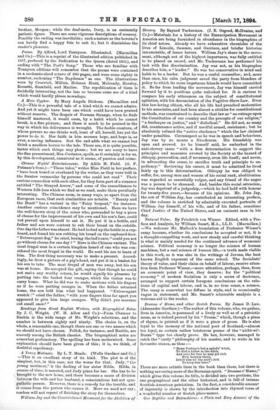William Jay and the Constitutional Movement for the Abolition of
Slavery. By Bayard Tuckerman. (J. R. Osgood, Mellvaine, and Co.)—Materials for a history of the Emancipation Movement in America are being furnished in abundance in the biographies of its chief actors. Already we have exhaustive chronicles of the lives of Lincoln, Sumner, and Garrison, and briefer histories innumerable, of lesser heroes. William Jay's share in the move- ment, although not of the highest importance, was fully entitled to be placed on record, and Mr. Tuckerman has performed his task with fine discrimination. Jay was not, as his biographer describes him, a " leader." He was too conservative in mind and habit to be a leader. But he was a useful counsellor; and, more than once, his calm judgment saved the party from blunders of policy to which its more impetuous friends would have committed it. So far from leading the movement, Jay was himself carried forward by it to positions quite unlooked for. It is curious to compare his early utterances on the subject of constitutional agitation, with his denunciation of the Fugitive Slave Law. Even this law-loving citizen, who all his life had preached moderation to his associates, and had been almost a stickler for constitutional methods, was constrained to describe that law as " an outrage upon the Constitution of our country and the precepts of our religion," " a burlesque on justice," and " diabolical." He did not, as many did, countenance active, and if needful armed, resistance; but he absolutely refused the "active obedience" which the law claimed "under penalties. Circumspect as he was in speech an behaviour, Jay was by no means a Nicodemus. His friendship was open and avowed. As he himself said, he embarked in the anti-slavery cause " with a firm determination to support the principles and measures avowed by the Society at the hazard of obloquy, persecution, and, if necessary, even life itself; and never, in advocating the cause, to sacrifice truth and principle to ex- pediency." Reviewing his career, it must be admitted he lived fairly up to this determination. Obloquy he was obliged to suffer, for, among men and women of his social rank, abolitionism was regarded as essentially vulgar, and any friend of the negro was a person to be shunned. And, besides this social ostracism, Jay was deprived of a judgeship,—which he had held with honour for twenty-five years,—because of his opinions. Mr. John Jay, the son of William Jay, has contributed an interesting preface, and the volume is enriched by admirably executed portraits of William Jay himself, of his wife, and of his father, sometime Chief Justice of the United States, and an eminent man in his day.


































 Previous page
Previous page